Hey there! You've stumbled upon my blog. If you're a fellow art museum junky, chronic explorer of the world and lover of making beautiful things, we're about to be very good friends. Happy exploring!
home
welcome to
the blog
LIFESTYLE
ART
TRAVEL
How To Immerse Yourself in a Language
Spanish Edition
I always tell people that the best thing I got out of my failed relationship with a Spaniard was a love for the Spanish language. Moreover, after traveling through Europe I found that most people my age were fluent in at least two languages. As a result, I became increasingly self-conscious of my inability to speak more than English and a little broken French and Cambodian. So, I made up my mind to achieve fluency in as many languages as I could. After all, the ability to make cross-cultural connections is the core of my purpose as a traveler, blogger and artist. Spanish was first on my list, and I would soon dip my toes into Portuguese, Italian, and German. Through all of this, I’ve been on a journey to discover how to immerse yourself in a language effectively and effortlessly.
IS IT TOO LATE FOR ME?
A lot of people would assume learning a language is too difficult once we’ve reached adulthood, but I don’t believe that for a second. Sure, there’s nothing like our rapid ability to pick up a language as a child. But I never had as much motivation to learn on my own terms as I did when I started teaching myself Spanish at age 22. That motivation has been the key to my ability to learn Spanish in a relatively short time. Let’s dive into my top tips, tricks, and practices for how to immerse yourself in a language like it’s your job!

My core principle for how to immerse yourself in a language
Take a diverse approach. Language is such a multi-faceted thing. The fastest way to pick it up is to dive into as many different linguistic experiences you can. Read, write, listen, speak, and in different settings, circumstances, and with different tools. Don’t limit yourself to one mode of learning, try to incorporate the new language into as many parts of your life as possible.

Practice Speaking
Get Comfortable Doing It
This is definitely the most intimidating element of learning a language, for me, and many other language learners. Our fear of sounding stupid or making mistakes often holds us back. For me, I was especially reluctant to practice my Spanish speaking because of my inability to roll my R’s.
Perspective
But one of the most important steps in language immersion is working to work to break down those insecurities. Your progress will increase exponentially once you get over the initial hump of learning to get comfortable speaking.
Some tips on achieving this? Firstly, put things into perspective. I always think of people who aren’t native English speakers who I get to interact with. Even if they make grammatical mistakes, have to ask me for the correct word to use, or have a distinct accent, I never pass judgment. In fact, I always admire their ability and willingness to speak a language different than their native tongue.
People are not going to care if you make mistakes. If they do, who cares, odds are you’ll never see them again anyway. Start framing every chance to practice your speaking as a valuable opportunity to progress. Bustling tapas bars are one of my favorite places to meet Spanish locals and to practice conversation. Plus who doesn’t love talking about good food and drink? Check out my ultimate guide to eating tapas like a Spaniard for tips on how find the best tapas bars.
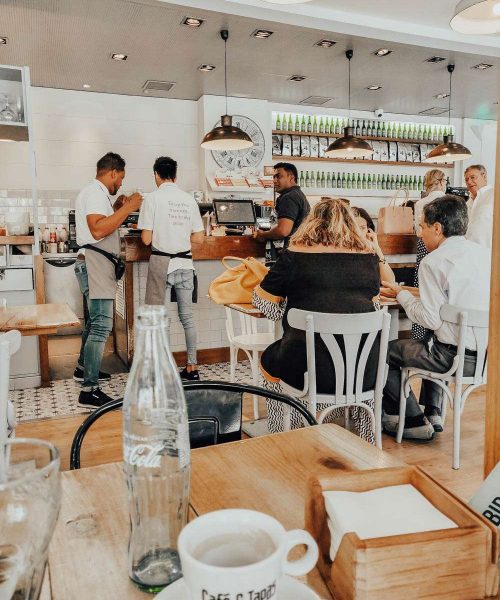
Preparation
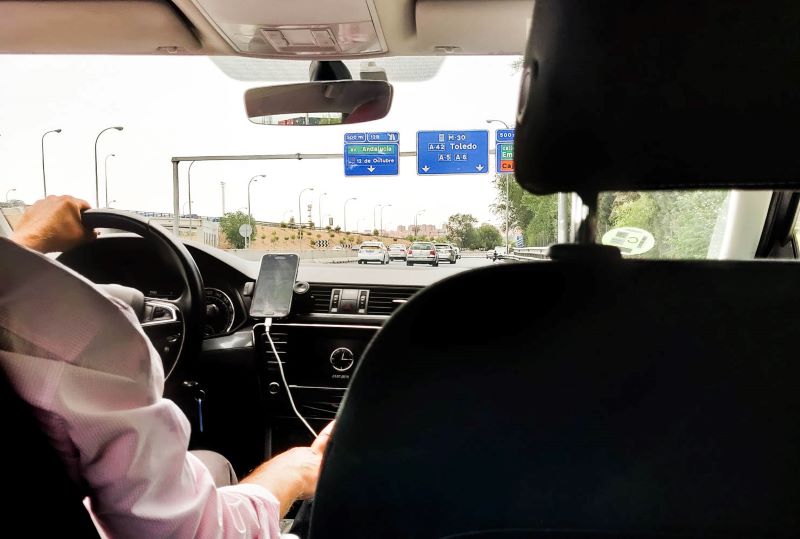
Usually, starting the conversation is the hardest part for me. To combat this, I typically prep a question or a phrase ahead of time when I’m going into any situation where I know there will be potential for me to practice.
For example, when traveling through Spain, I would often have questions like “¿Vives aqui en Espana?” Or “¿Quereis que os saque una fota para vosotros?” top of mind when getting into an Uber or visiting a touristy area. Asking someone if they lived in Spain, or wanted me to take a photo for them were handy conversation starters that gave me a bit of confidence and a higher inclination to initiate a conversation.
Ways to Practice Speaking Without Traveling
Given the circumstances from COVID-19 in 2020, it’s understandable that travel to Spanish speaking countries may not be an option. Even if you don’t have Spanish speaking friends or family, there are loads of ways you can get speaking practice in.
Connect with Native Speakers Online
Download the app HelloTalk. It is an awesome (free!) app that I discovered earlier this year that allows you to message people around the world. Everyone on the platform is using it to learn and practice a language that isn’t their own, so can find loads of Spanish speakers who are happy to chat with you. You can use messaging, voice recordings or even phone/video chats to practice speaking with you connect with. In return, you’ll help them practice their English (or whatever language you want to help them with!) It is a super great resource to learn more colloquial Spanish and gain a greater cultural understanding.

Talk to Yourself
Another method I used quite a bit when first teaching myself Spanish was – please don’t judge – talking to myself. On the drive to work, on my walks, in the shower, wherever there aren’t people to judge me, I would just describe my day, plans for the weekend, something that was on my mind, really anything. Moreover, it’s a great opportunity to practice speaking without the pressure of trying to hold a conversation with someone. Try it, don’t worry – I won’t tell anyone
Shadowing
My current most used form of speaking practice is an exercise one of my Spanish tutors recently taught me called “shadowing.” This is an exercise that can really fast track the development of a more authentic Spanish accent.
Find a podcast (Radio Ambulante is one my favorites for this exercise) or another form of audio featuring a Native Spanish speaker. It is helpful if it is accompanied by a transcript. Listen to one or two sentences at a time, pause the audio, and then repeat the phrase verbatim. The point of the exercise is not to focus on the meaning of the phrase, but to mimic the pronunciation and accent of the Spanish speaker.

Bite the Bullet – Master the Grammar
It Can be Fun!

Apps
I’ve tried quite a few language apps – from Duolingo, to Rosetta Stone, and Pimsleur. While I don’t rely on language apps to provide the ultimate solution to how to immerse yourself in a language, they are a great tool to practice listening, speaking, writing, and reading. I like to make a habit of practicing on language apps for a short time each day. I usually allot fifteen minutes in the mornings before work and fifteen minutes during my lunch break, as well as during any times where I may be standing around waiting, or while in the car (as a passenger!)
Babbel
While Duolingo is probably the most well-known language app (it’s awesome because it’s free!), I actually much prefer Babbel. While I do have the paid version, I definitely think it is worth it. It provides much more structure than Duolingo which I think is hugely important, especially when first learning a language.
You can select different courses, levels, and topics to dive into. My favorite section is the grammar course, where different tenses and grammatical principals are broken down into individual lessons. The review function is also great in helping cycle through all the vocab and grammar you’ve learned so it stays fresh. Repetition is key to getting language to fully stick. Grammar can be a daunting beast to tackle. I think a well-structured lesson plan like this one is the best way to break things down into a more approachable format.
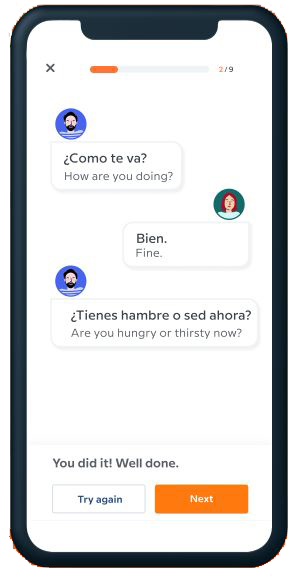
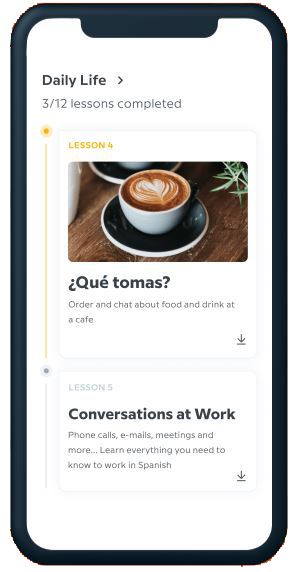
Busuu
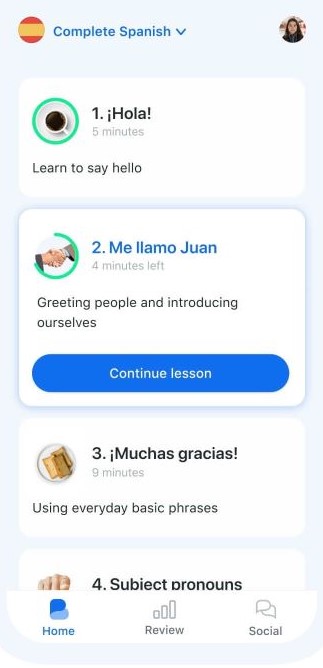
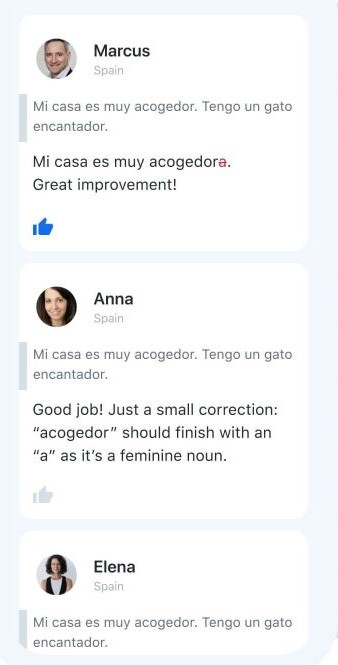
My second favorite language app is Busuu. Like Babbel, it offers a lot of structure in terms of formulating lessons with new vocab and grammar, and then speaking, writing, and reading exercises to accompany. My favorite part of the app is the ability to get feedback on your speaking and writing from Spanish speakers using the app.
Memrise
A new recent staple of mine is the app Memrise. This is more focused on the memorization of vocabulary/short phrases – perfect if you’re brand new to a language. I’ve found it is particularly great for hearing pronunciation by Native speakers in short video clips. I’ve been using it predominantly for my Italian, German, and Portuguese immersion as I am a beginning learner of these languages.
Workbooks (MY Secret Weapon)
We all have different learning styles, and for me, writing things out by hand and having hard copies of things in front of me has always been the most effective way for me to learn. Workbooks and handwritten notes have been my secret weapon. Workbooks are a little more accessible than apps at times, just because it’s easy to flip back and forth to reference different lessons, grammar rules, and vocabulary lists. It’s also a well-known fact that writing things out by hand is one of the most effective information absorption techniques for how to immerse yourself in a language as multiple parts of the brain are stimulated.
Irregular verb conjugation and keeping different verb tenses straight are two concepts that are incredibly tricky to navigate. I rely on written exercises to practice these skills.
I’ve gotten into a habit of making time twice a week to sit down with a glass of wine or go to a coffee shop to bang out an hour or so of workbook practice.
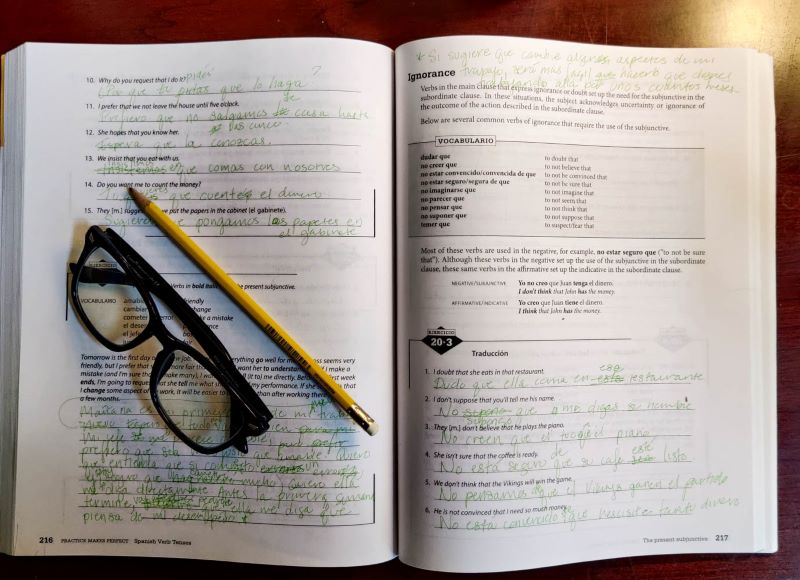
My Favorite Workbooks
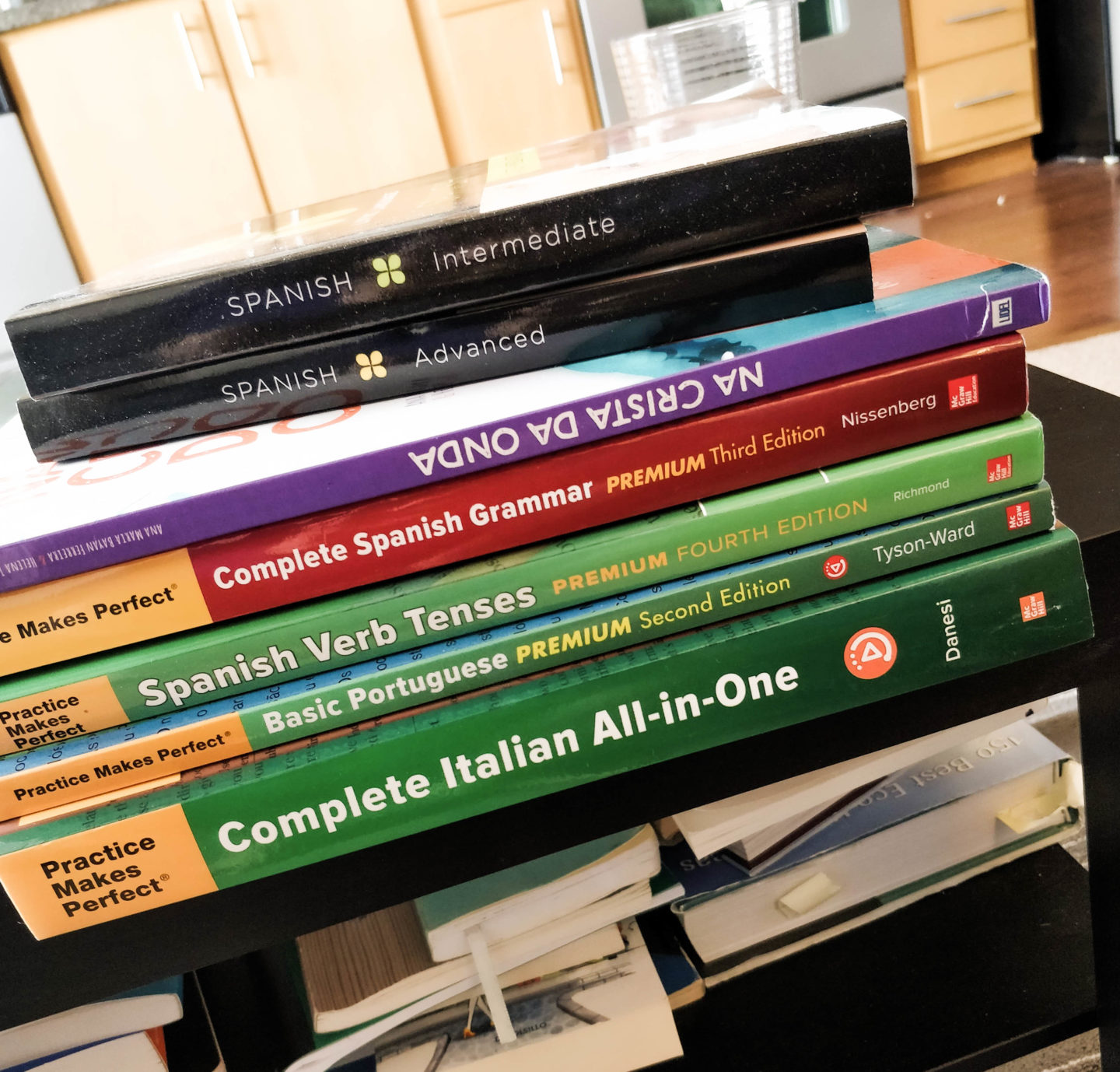
Practice Makes Perfect: Complete Spanish Grammar and Practice Makes Perfect: Spanish Verb Tenses: I love the Practice Makes Perfect workbooks, I also have these for my Italian studies.
Learning Language Spanish: Great reference tables for common irregular verbs conjugations in all its different tenses
Incorporating Spanish Into Your Day-To-Day
Change Your UI to Spanish
Do not limit your Spanish practice to your allotted daily practice or study. There are endless ways to effortlessly immerse yourself in the language while doing what you would do anyways… Find ways to change the default language of interfaces you use to Spanish. If you’re a beginner, it might be best to wait until your reading comprehension is a bit more proficient. You can change your phone, Siri, Google Home, or computer to all utilize Spanish rather than English. Also, be sure to add Spanish as one of your keyboard’s default languages so you can type properly without your phone or computer auto-correcting every word.
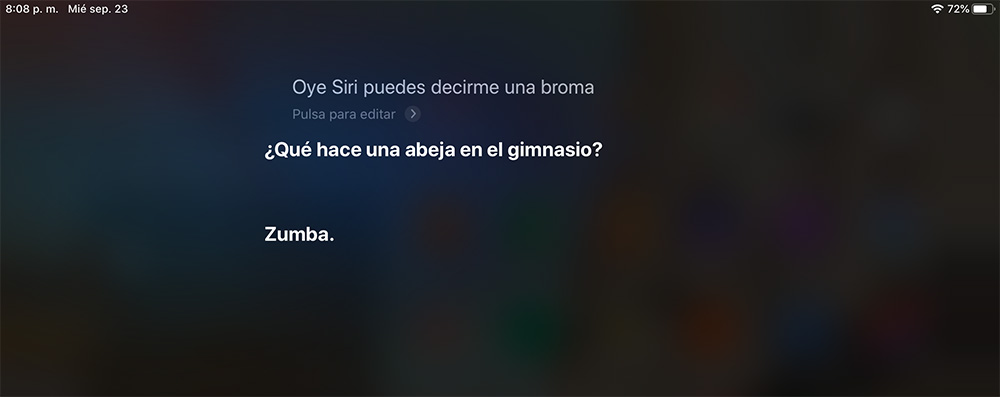
Start Replacing Everyday English with Spanish
Early on, I also got into the habit of writing all my notes to myself/calendar events/journal entries in Spanish. This allows you to start getting a better grasp on your most frequently used vocabulary. I also found posting verb conjugations/new vocal on my bathroom mirror to review while brushing my teeth was another easy way to sneak some vocab/grammar review into my day. Get creative with finding places to leave yourself notes like this!
Listen to music
This was one of the biggest strategies that I used when I first started Spanish immersion. I would listen to Spanish music constantly. There are tons of mainstream music sung by Latin and Spanish singers. Search “Latin” or “Spanish” on Spotify and you’ll find an entire genre with playlists, podcasts, and artists.
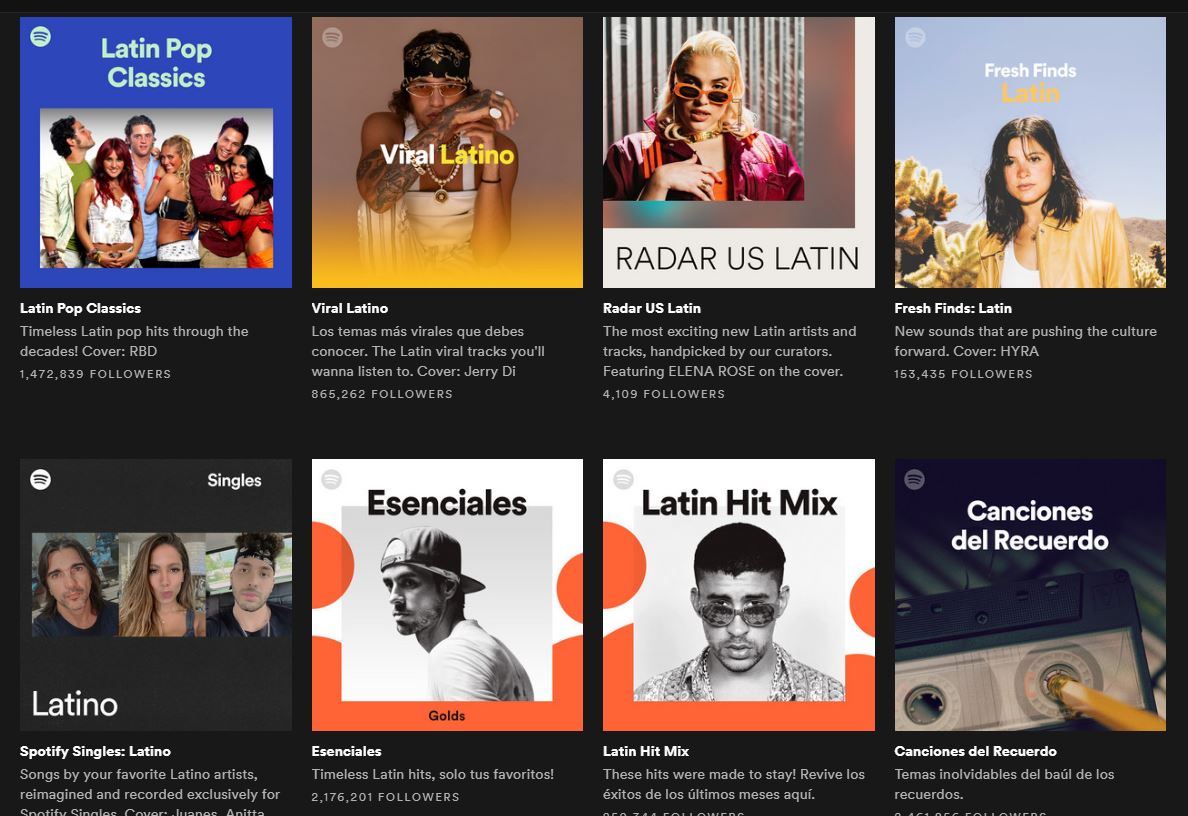
SOME OF MY FAVORITE SPANISH AND LATIN ARTISTS:
How to Leverage Music as a Spanish Immersion Skill
I’ve found the best way to get the most out of listening to music in a foreign language is by giving a song a few listens through, trying to understand as many of the lyrics as you can. Once you’ve given it a few listens – look up the lyrics online and see what parts you understood correctly as well as the parts you couldn’t make out. After looking up the lyrics go back to listen to the song and try to listen for the new lyrics that you learned.
Podcasts
For all the podcast lovers out there – there are also TONS of amazing podcasts for Spanish speakers and learners. Coffee Break Spanish is far and away one of the best resources that I used when I first was learning Spanish. Their Season 1 content is perfect for beginners, with structured grammar lessons that kick start your understanding of basic language rules. Season 2 and Season 3, along with the Coffee Break Magazine series are wonderful for enhancing your listening comprehension with fun storylines/telenovela style plots, and interviews featuring native Spanish speakers.
Some of my other favorite Spanish podcasts are News in Slow Spanish (exactly what it sounds like), Radio Ambulante (an NPR podcast on Latin American stories), and Se Regalan Dudas (two girls from Mexico discuss universal struggles we face in life – from relationships, to family, to self-love). The Duolingo podcast is also a great resource I used at the beginning of my Spanish-speaking journey. These real-life stories are narrated by native Spanish speakers from all over the world. It is designed specifically for intermediate Spanish learners.
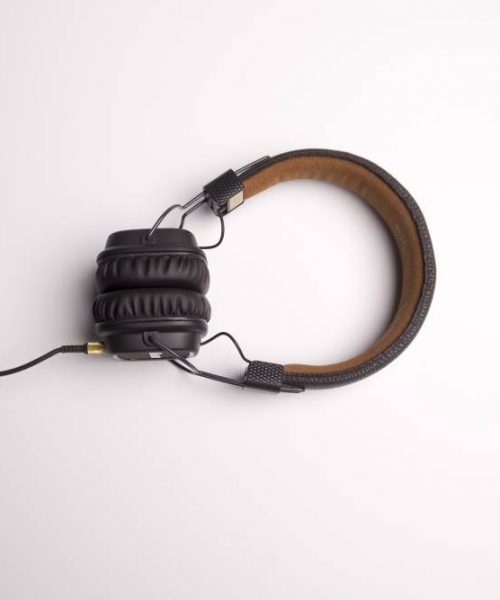
Give Your Netflix a Spanish Twist

Another easy hack for anyone who watches Netflix, Hulu, movies, etc – turn Spanish subtitles on while you’re watching. This is such an easy (and fun) way to pick up on new vocabulary. It’s most effective for me when I’m watching shows or movies that I already know by heart. That way I already know the content and it’s easy to absorb the Spanish translation. When you’re first starting out, I find this is even more effective than watching Spanish movies with English subtitles. This is just because it’s a bit easier to listen to the English and read the Spanish, rather than vice versa, when your Spanish listening comprehension may not be as quick.
If you’re in search of some good Netflix shows or movies in Spanish, here are a few of my favorites:
Casa de Papel (or Moneyheist, in English)
Elite – Think Gossip Girl, but set in Spain.
Narcos
Roma
Comedians From Around the World – Mexico
Chef’s Table – These aren’t all in Spanish, but a few episodes feature Spanish and Latin American chefs.
If you have Hulu – there are some shows that are dubbed over in Spanish like Full House and Desperate Housewives!
How to Immerse Yourself in a Language – a Fast-Track
Tutors
Tutoring or Spanish classes is another resource that allows you a fully immersive experience. While I didn’t start utilizing private tutoring lessons until about a year into my Spanish-learning journey, it is part of my daily routine now. I know what you’re thinking, isn’t that crazy expensive?
A year ago I definitely thought tutoring was something I couldn’t afford and when I finally had enough money saved up to have tutoring lessons once a week, it was still a big dent in my monthly savings (typically around 40 dollars an hour). I utilized Wyzant – a tutoring platform, where I found my Spanish, Italian, and Portuguese tutors. I really enjoyed my tutoring sessions but found it to be a bit too pricey.
Baselang – A Gamechanger
Thanks to Google ads, I stumbled upon the website Baselang. For 149 dollars a month you get unlimited private tutoring lessons. This was practically the same amount of money I had been paying my Wyzant tutors for one lesson a week. To me it was a no brainer, so I signed up. I typically do about 5 lessons a week which comes out to about 7 dollars a session. Although I know it is still a bit of an investment if money is tight – for me, it is so worth it. Getting to work one-on-one with a tutor who helps with grammar, new vocabulary, pronunciation, as well cultural context is absolutely invaluable. I had also found my listening comprehension and ability to speak fluidly were what I was struggling with most. Because of this, having lessons with an instructor was something that really helped sharpen up my conversational skills.
Again – it is definitely not necessary to hire a tutor or take classes. I did without it for the first year. But just know there are affordable options out there! A friend of mine also recommended Italki, a site for finding very affordable language tutors.
How To Immerse Yourself In A Language
The Key
I truly think the key to my success in learning Spanish was the fact that I fell in love with the language and the process. Once you discover how to immerse yourself in a language, the natural progress becomes something motivational and exciting.
Language is such an invaluable tool that connects you with infinite opportunities, people, and cultures. While learning and immersing yourself in something new always has its own challenges, being able to experience growth is what always keeps me going.
So in short, how to immerse yourself in a language? Be open-minded, take a diverse approach, be consistent, and don’t give up! I promise you it is five hundred percent worth it.
I can’t wait to hear about your guys’ experience. Feel free to leave me a comment or send me an email if any of these resources and tips were helpful to you. If you have any further questions about your Spanish-learning journey do not hesitate to reach out!
Besos, hasta la proxima!
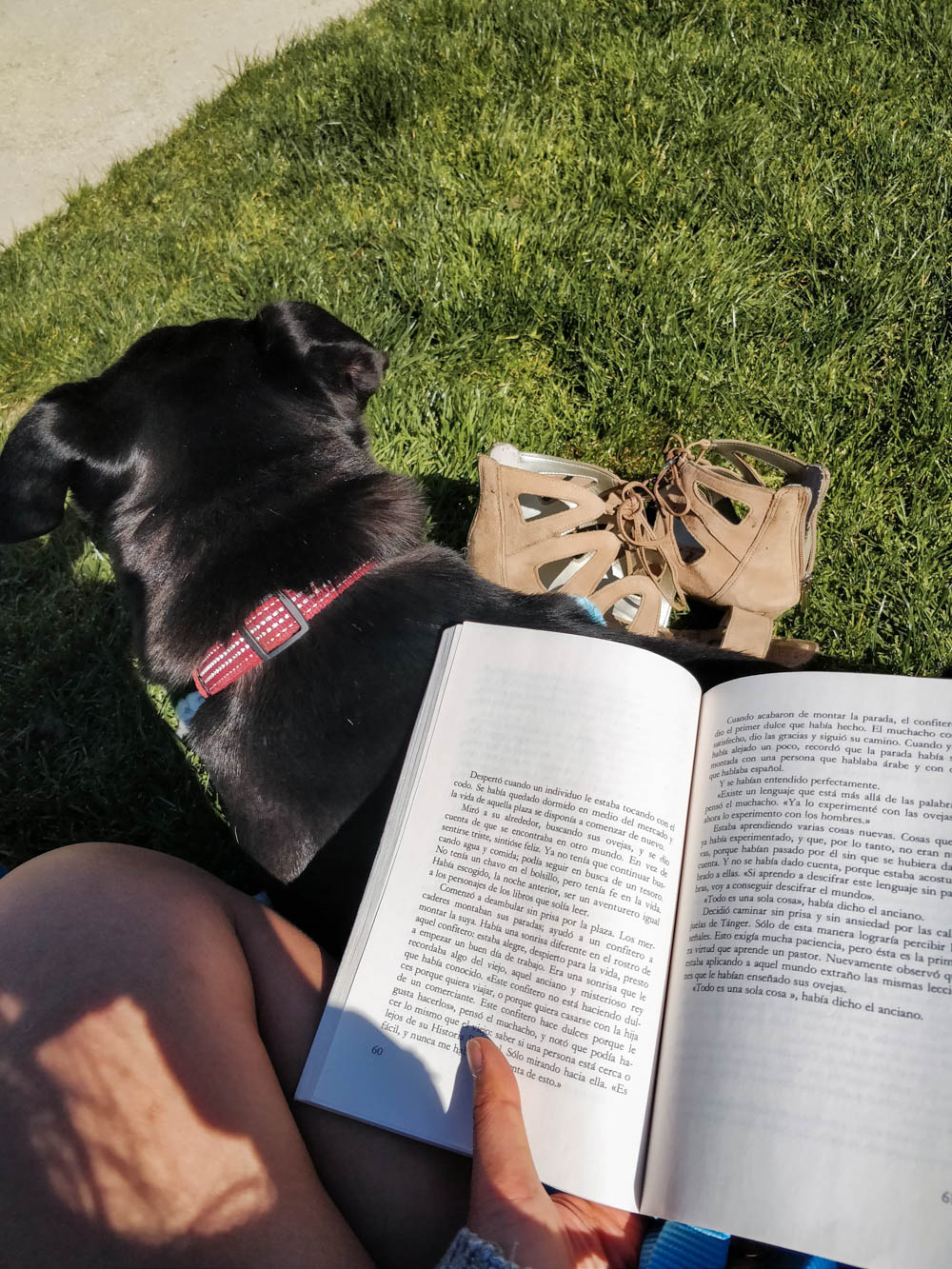
Pin This Post!
How To Immerse Yourself In A Language
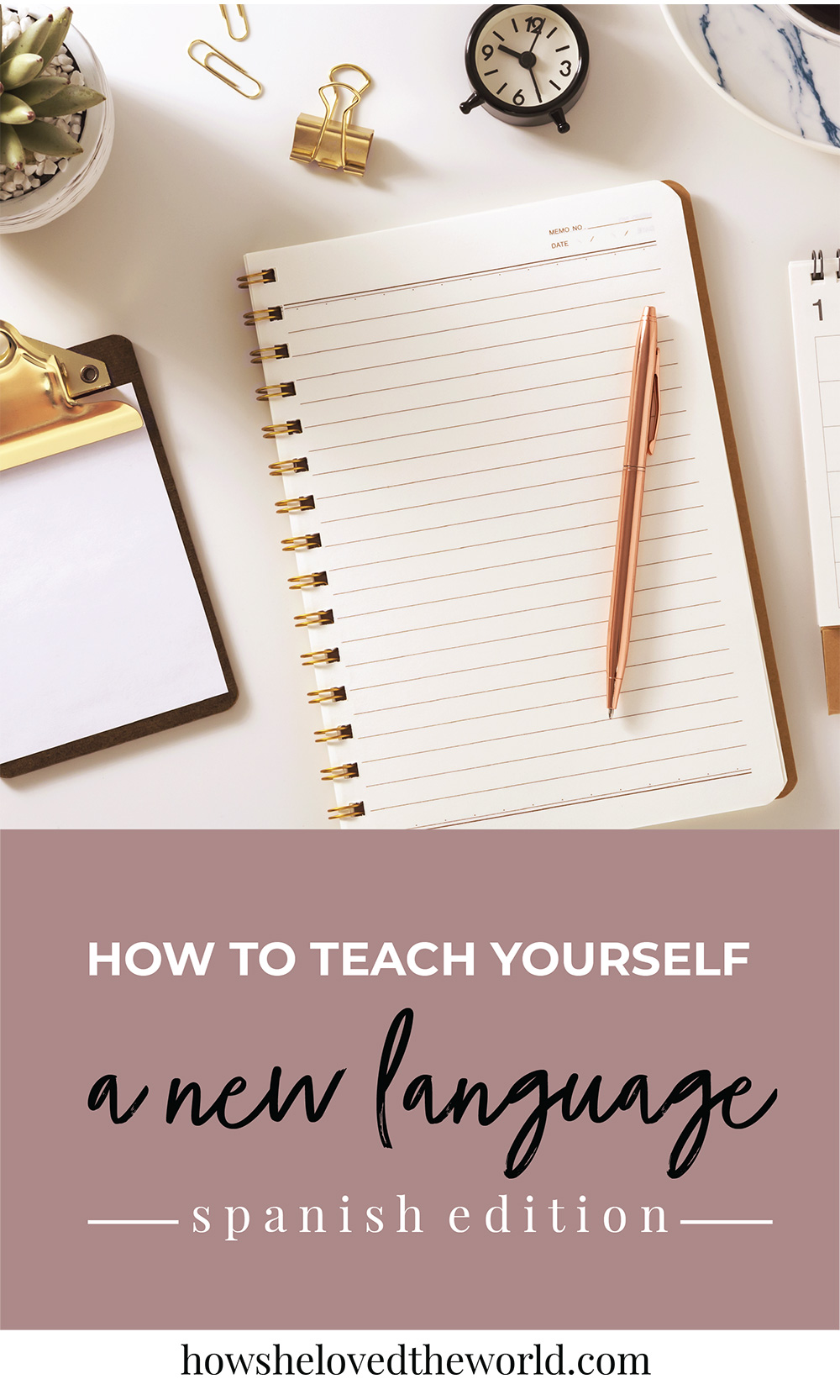
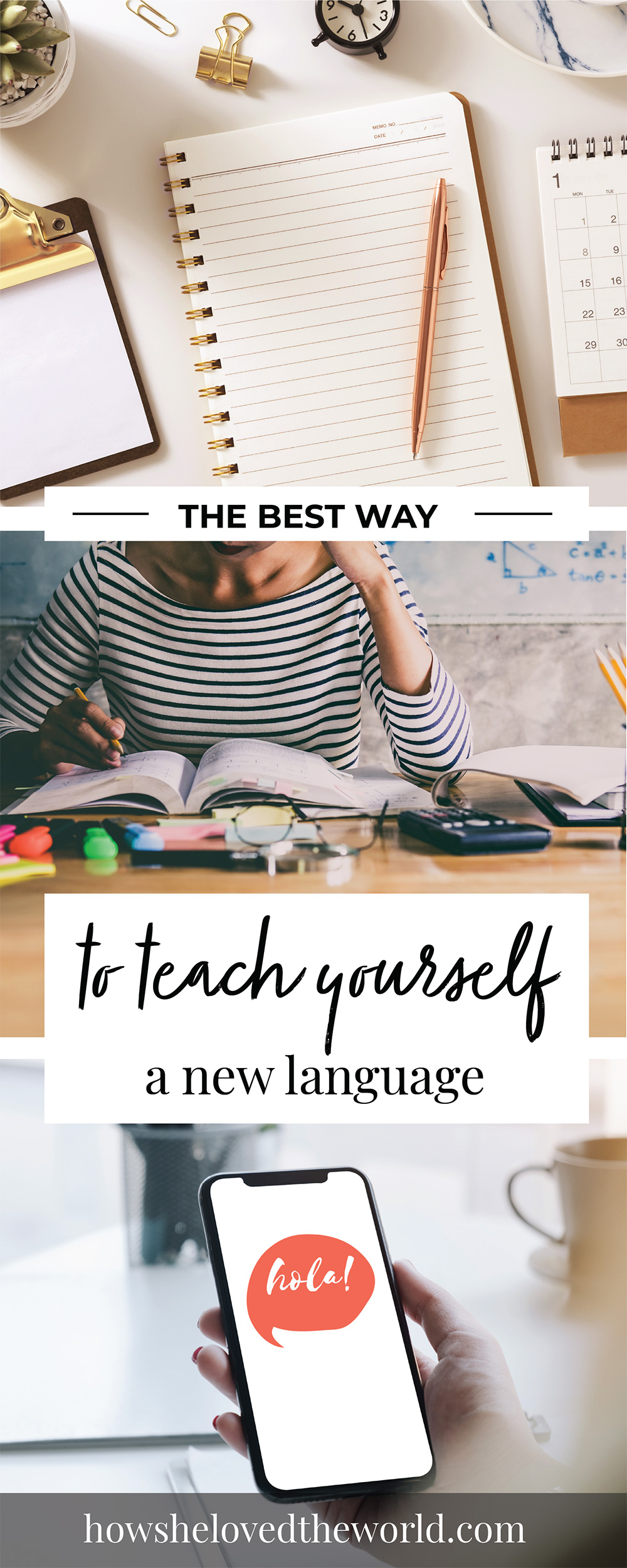
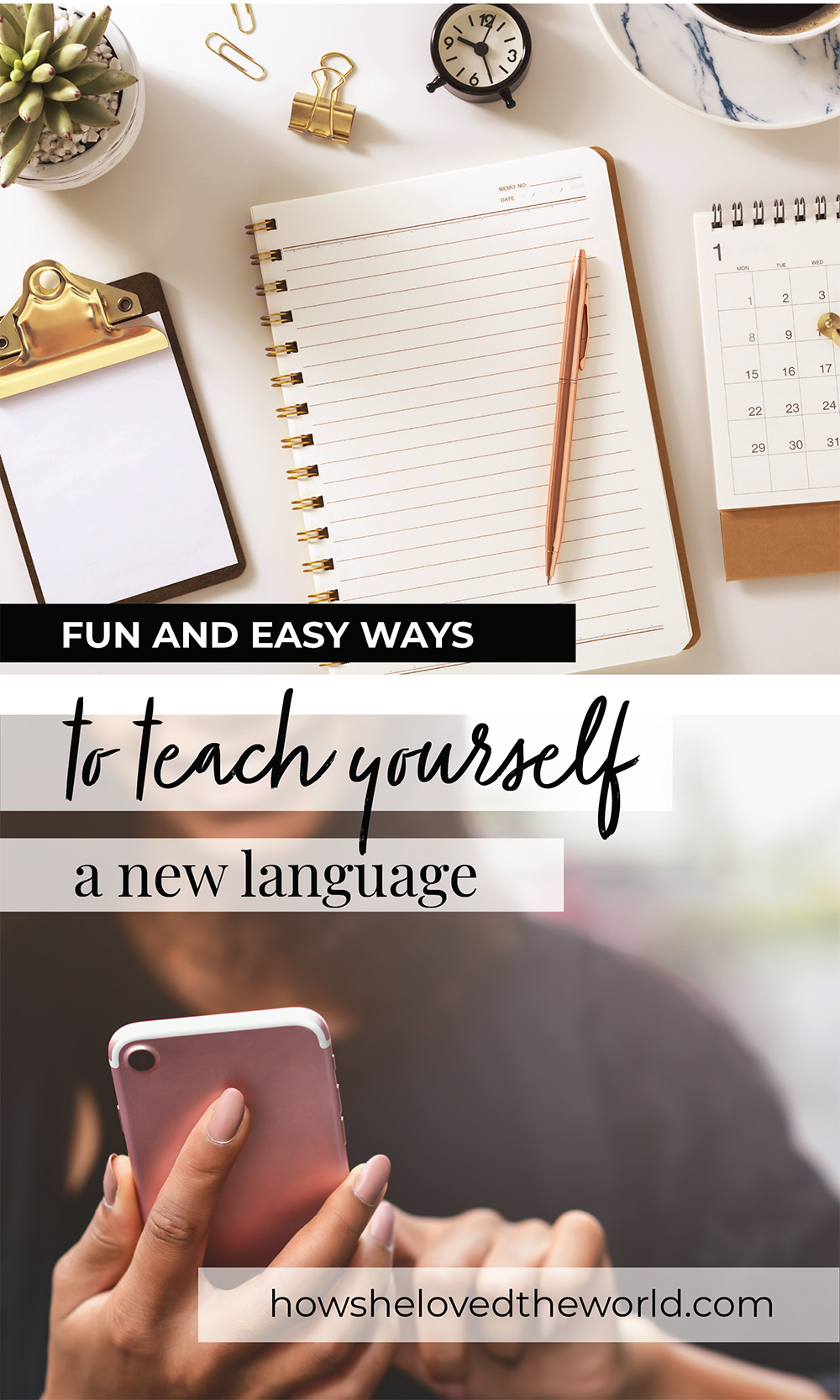
Disclaimer: Some of my posts contain affiliate links. I will make a small commission if you click and choose to make a purchase or reservation, at no extra cost to you! Rest assured, I will only promote products that I love whole-heartedly and believe you will to!
How To Immerse Yourself in a Language
Spanish Edition
I always tell people that the best thing I got out of my failed relationship with a Spaniard was a love for the Spanish language. Moreover, after traveling through Europe I found that most people my age were fluent in at least two languages. As a result, I became increasingly self-conscious of my inability to speak more than English and a little broken French and Cambodian. So, I made up my mind to achieve fluency in as many languages as I could. After all, the ability to make cross-cultural connections is the core of my purpose as a traveler, blogger and artist. Spanish was first on my list, and I would soon dip my toes into Portuguese, Italian, and German. Through all of this, I’ve been on a journey to discover how to immerse yourself in a language effectively and effortlessly.
IS IT TOO LATE FOR ME?
A lot of people would assume learning a language is too difficult once we’ve reached adulthood, but I don’t believe that for a second. Sure, there’s nothing like our rapid ability to pick up a language as a child. But I never had as much motivation to learn on my own terms as I did when I started teaching myself Spanish at age 22. That motivation has been the key to my ability to learn Spanish in a relatively short time. Let’s dive into my top tips, tricks, and practices for how to immerse yourself in a language like it’s your job!

My core principle for how to immerse yourself in a language
Take a diverse approach. Language is such a multi-faceted thing. The fastest way to pick it up is to dive into as many different linguistic experiences you can. Read, write, listen, speak, and in different settings, circumstances, and with different tools. Don’t limit yourself to one mode of learning, try to incorporate the new language into as many parts of your life as possible.

Practice Speaking
Get Comfortable Doing It
This is definitely the most intimidating element of learning a language, for me, and many other language learners. Our fear of sounding stupid or making mistakes often holds us back. For me, I was especially reluctant to practice my Spanish speaking because of my inability to roll my R’s.
Perspective
But one of the most important steps in language immersion is working to work to break down those insecurities. Your progress will increase exponentially once you get over the initial hump of learning to get comfortable speaking.
Some tips on achieving this? Firstly, put things into perspective. I always think of people who aren’t native English speakers who I get to interact with. Even if they make grammatical mistakes, have to ask me for the correct word to use, or have a distinct accent, I never pass judgment. In fact, I always admire their ability and willingness to speak a language different than their native tongue.
People are not going to care if you make mistakes. If they do, who cares, odds are you’ll never see them again anyway. Start framing every chance to practice your speaking as a valuable opportunity to progress. Bustling tapas bars are one of my favorite places to meet Spanish locals and to practice conversation. Plus who doesn’t love talking about good food and drink? Check out my ultimate guide to eating tapas like a Spaniard for tips on how find the best tapas bars.

Preparation

Usually, starting the conversation is the hardest part for me. To combat this, I typically prep a question or a phrase ahead of time when I’m going into any situation where I know there will be potential for me to practice.
For example, when traveling through Spain, I would often have questions like “¿Vives aqui en Espana?” Or “¿Quereis que os saque una fota para vosotros?” top of mind when getting into an Uber or visiting a touristy area. Asking someone if they lived in Spain, or wanted me to take a photo for them were handy conversation starters that gave me a bit of confidence and a higher inclination to initiate a conversation.
Ways to Practice Speaking Without Traveling
Given the circumstances from COVID-19 in 2020, it’s understandable that travel to Spanish speaking countries may not be an option. Even if you don’t have Spanish speaking friends or family, there are loads of ways you can get speaking practice in.
Connect with Native Speakers Online
Download the app HelloTalk. It is an awesome (free!) app that I discovered earlier this year that allows you to message people around the world. Everyone on the platform is using it to learn and practice a language that isn’t their own, so can find loads of Spanish speakers who are happy to chat with you. You can use messaging, voice recordings or even phone/video chats to practice speaking with you connect with. In return, you’ll help them practice their English (or whatever language you want to help them with!) It is a super great resource to learn more colloquial Spanish and gain a greater cultural understanding.

Talk to Yourself
Another method I used quite a bit when first teaching myself Spanish was – please don’t judge – talking to myself. On the drive to work, on my walks, in the shower, wherever there aren’t people to judge me, I would just describe my day, plans for the weekend, something that was on my mind, really anything. Moreover, it’s a great opportunity to practice speaking without the pressure of trying to hold a conversation with someone. Try it, don’t worry – I won’t tell anyone
Shadowing
My current most used form of speaking practice is an exercise one of my Spanish tutors recently taught me called “shadowing.” This is an exercise that can really fast track the development of a more authentic Spanish accent.
Find a podcast (Radio Ambulante is one my favorites for this exercise) or another form of audio featuring a Native Spanish speaker. It is helpful if it is accompanied by a transcript. Listen to one or two sentences at a time, pause the audio, and then repeat the phrase verbatim. The point of the exercise is not to focus on the meaning of the phrase, but to mimic the pronunciation and accent of the Spanish speaker.

Bite the Bullet – Master the Grammar
It Can be Fun!

Apps
I’ve tried quite a few language apps – from Duolingo, to Rosetta Stone, and Pimsleur. While I don’t rely on language apps to provide the ultimate solution to how to immerse yourself in a language, they are a great tool to practice listening, speaking, writing, and reading. I like to make a habit of practicing on language apps for a short time each day. I usually allot fifteen minutes in the mornings before work and fifteen minutes during my lunch break, as well as during any times where I may be standing around waiting, or while in the car (as a passenger!)
Babbel
While Duolingo is probably the most well-known language app (it’s awesome because it’s free!), I actually much prefer Babbel. While I do have the paid version, I definitely think it is worth it. It provides much more structure than Duolingo which I think is hugely important, especially when first learning a language.
You can select different courses, levels, and topics to dive into. My favorite section is the grammar course, where different tenses and grammatical principals are broken down into individual lessons. The review function is also great in helping cycle through all the vocab and grammar you’ve learned so it stays fresh. Repetition is key to getting language to fully stick. Grammar can be a daunting beast to tackle. I think a well-structured lesson plan like this one is the best way to break things down into a more approachable format.


Busuu


My second favorite language app is Busuu. Like Babbel, it offers a lot of structure in terms of formulating lessons with new vocab and grammar, and then speaking, writing, and reading exercises to accompany. My favorite part of the app is the ability to get feedback on your speaking and writing from Spanish speakers using the app.
Memrise
A new recent staple of mine is the app Memrise. This is more focused on the memorization of vocabulary/short phrases – perfect if you’re brand new to a language. I’ve found it is particularly great for hearing pronunciation by Native speakers in short video clips. I’ve been using it predominantly for my Italian, German, and Portuguese immersion as I am a beginning learner of these languages.
Workbooks (MY Secret Weapon)
We all have different learning styles, and for me, writing things out by hand and having hard copies of things in front of me has always been the most effective way for me to learn. Workbooks and handwritten notes have been my secret weapon. Workbooks are a little more accessible than apps at times, just because it’s easy to flip back and forth to reference different lessons, grammar rules, and vocabulary lists. It’s also a well-known fact that writing things out by hand is one of the most effective information absorption techniques for how to immerse yourself in a language as multiple parts of the brain are stimulated.
Irregular verb conjugation and keeping different verb tenses straight are two concepts that are incredibly tricky to navigate. I rely on written exercises to practice these skills.
I’ve gotten into a habit of making time twice a week to sit down with a glass of wine or go to a coffee shop to bang out an hour or so of workbook practice.

My Favorite Workbooks

Practice Makes Perfect: Complete Spanish Grammar and Practice Makes Perfect: Spanish Verb Tenses: I love the Practice Makes Perfect workbooks, I also have these for my Italian studies.
Learning Language Spanish: Great reference tables for common irregular verbs conjugations in all its different tenses
Incorporating Spanish Into Your Day-To-Day
Change Your UI to Spanish
Do not limit your Spanish practice to your allotted daily practice or study. There are endless ways to effortlessly immerse yourself in the language while doing what you would do anyways… Find ways to change the default language of interfaces you use to Spanish. If you’re a beginner, it might be best to wait until your reading comprehension is a bit more proficient. You can change your phone, Siri, Google Home, or computer to all utilize Spanish rather than English. Also, be sure to add Spanish as one of your keyboard’s default languages so you can type properly without your phone or computer auto-correcting every word.

Start Replacing Everyday English with Spanish
Early on, I also got into the habit of writing all my notes to myself/calendar events/journal entries in Spanish. This allows you to start getting a better grasp on your most frequently used vocabulary. I also found posting verb conjugations/new vocal on my bathroom mirror to review while brushing my teeth was another easy way to sneak some vocab/grammar review into my day. Get creative with finding places to leave yourself notes like this!
Listen to music
This was one of the biggest strategies that I used when I first started Spanish immersion. I would listen to Spanish music constantly. There are tons of mainstream music sung by Latin and Spanish singers. Search “Latin” or “Spanish” on Spotify and you’ll find an entire genre with playlists, podcasts, and artists.

SOME OF MY FAVORITE SPANISH AND LATIN ARTISTS:
How to Leverage Music as a Spanish Immersion Skill
I’ve found the best way to get the most out of listening to music in a foreign language is by giving a song a few listens through, trying to understand as many of the lyrics as you can. Once you’ve given it a few listens – look up the lyrics online and see what parts you understood correctly as well as the parts you couldn’t make out. After looking up the lyrics go back to listen to the song and try to listen for the new lyrics that you learned.
Podcasts
For all the podcast lovers out there – there are also TONS of amazing podcasts for Spanish speakers and learners. Coffee Break Spanish is far and away one of the best resources that I used when I first was learning Spanish. Their Season 1 content is perfect for beginners, with structured grammar lessons that kick start your understanding of basic language rules. Season 2 and Season 3, along with the Coffee Break Magazine series are wonderful for enhancing your listening comprehension with fun storylines/telenovela style plots, and interviews featuring native Spanish speakers.
Some of my other favorite Spanish podcasts are News in Slow Spanish (exactly what it sounds like), Radio Ambulante (an NPR podcast on Latin American stories), and Se Regalan Dudas (two girls from Mexico discuss universal struggles we face in life – from relationships, to family, to self-love). The Duolingo podcast is also a great resource I used at the beginning of my Spanish-speaking journey. These real-life stories are narrated by native Spanish speakers from all over the world. It is designed specifically for intermediate Spanish learners.

Give Your Netflix a Spanish Twist

Another easy hack for anyone who watches Netflix, Hulu, movies, etc – turn Spanish subtitles on while you’re watching. This is such an easy (and fun) way to pick up on new vocabulary. It’s most effective for me when I’m watching shows or movies that I already know by heart. That way I already know the content and it’s easy to absorb the Spanish translation. When you’re first starting out, I find this is even more effective than watching Spanish movies with English subtitles. This is just because it’s a bit easier to listen to the English and read the Spanish, rather than vice versa, when your Spanish listening comprehension may not be as quick.
If you’re in search of some good Netflix shows or movies in Spanish, here are a few of my favorites:
Casa de Papel (or Moneyheist, in English)
Elite – Think Gossip Girl, but set in Spain.
Narcos
Roma
Comedians From Around the World – Mexico
Chef’s Table – These aren’t all in Spanish, but a few episodes feature Spanish and Latin American chefs.
If you have Hulu – there are some shows that are dubbed over in Spanish like Full House and Desperate Housewives!
How to Immerse Yourself in a Language – a Fast-Track
Tutors
Tutoring or Spanish classes is another resource that allows you a fully immersive experience. While I didn’t start utilizing private tutoring lessons until about a year into my Spanish-learning journey, it is part of my daily routine now. I know what you’re thinking, isn’t that crazy expensive?
A year ago I definitely thought tutoring was something I couldn’t afford and when I finally had enough money saved up to have tutoring lessons once a week, it was still a big dent in my monthly savings (typically around 40 dollars an hour). I utilized Wyzant – a tutoring platform, where I found my Spanish, Italian, and Portuguese tutors. I really enjoyed my tutoring sessions but found it to be a bit too pricey.
Baselang – A Gamechanger
Thanks to Google ads, I stumbled upon the website Baselang. For 149 dollars a month you get unlimited private tutoring lessons. This was practically the same amount of money I had been paying my Wyzant tutors for one lesson a week. To me it was a no brainer, so I signed up. I typically do about 5 lessons a week which comes out to about 7 dollars a session. Although I know it is still a bit of an investment if money is tight – for me, it is so worth it. Getting to work one-on-one with a tutor who helps with grammar, new vocabulary, pronunciation, as well cultural context is absolutely invaluable. I had also found my listening comprehension and ability to speak fluidly were what I was struggling with most. Because of this, having lessons with an instructor was something that really helped sharpen up my conversational skills.
Again – it is definitely not necessary to hire a tutor or take classes. I did without it for the first year. But just know there are affordable options out there! A friend of mine also recommended Italki, a site for finding very affordable language tutors.
How To Immerse Yourself In A Language
The Key
I truly think the key to my success in learning Spanish was the fact that I fell in love with the language and the process. Once you discover how to immerse yourself in a language, the natural progress becomes something motivational and exciting.
Language is such an invaluable tool that connects you with infinite opportunities, people, and cultures. While learning and immersing yourself in something new always has its own challenges, being able to experience growth is what always keeps me going.
So in short, how to immerse yourself in a language? Be open-minded, take a diverse approach, be consistent, and don’t give up! I promise you it is five hundred percent worth it.
I can’t wait to hear about your guys’ experience. Feel free to leave me a comment or send me an email if any of these resources and tips were helpful to you. If you have any further questions about your Spanish-learning journey do not hesitate to reach out!
Besos, hasta la proxima!

Pin This Post!
How To Immerse Yourself In A Language



Disclaimer: Some of my posts contain affiliate links. I will make a small commission if you click and choose to make a purchase or reservation, at no extra cost to you! Rest assured, I will only promote products that I love whole-heartedly and believe you will to!